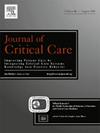绘制重症监护后恢复干预及其障碍的景观:一项全国性的横断面调查
IF 3.2
3区 医学
Q2 CRITICAL CARE MEDICINE
引用次数: 0
摘要
在重症监护室(ICU)或出院后开始的康复干预措施对于支持ICU幸存者及其家属至关重要。尽管国家指南旨在标准化和改善icu后护理,但由于系统和操作障碍,实施情况各不相同。目的本研究评估荷兰icu后护理的组织,评估国家指南建议在实践中是否适用,并从医疗保健专业人员的角度探讨实施的障碍。方法在荷兰所有有成人icu的医院(2023年11月- 2024年2月)进行一项全国性的横断面研究。一份结构化的电话问卷收集了关于ICU特征、ICU后护理协调、早期和晚期康复干预以及实施障碍的数据。这些数据与2018年的一项类似研究进行了比较。结果72例icu患者全部参与。虽然97.2%的医院提供了至少一项ICU早期和晚期康复干预,如ICU日记(97.2%)、病房随访(93.1%)和术后咨询(93.1%),但只有27.8%的医院报告采用了国家指南策略的全部内容。报告的障碍包括时间有限、人员短缺和财政限制。虽然与2018年相比,总体ICU后护理服务保持稳定,但在方案使用、护士参与ICU日记和家庭参与方面均有显着改善。结论:尽管icu后护理得到广泛应用,但国家指南建议的充分应用仍然有限。解决实际障碍对于促进一致、高质量的icu后护理至关重要。需要有针对性的干预措施来弥合差距,支持公平的、以患者为中心的康复途径。本文章由计算机程序翻译,如有差异,请以英文原文为准。
Mapping the landscape of post-intensive care recovery interventions and their barriers: A nationwide cross-sectional survey
Background
Recovery interventions initiated in the intensive care unit (ICU) or after discharge are essential for supporting ICU survivors and their families. Despite national guidelines aimed at standardizing and improving post-ICU care, implementation varies due to systemic and operational barriers.
Aim
This study evaluates the organization of post-ICU care in the Netherlands, assesses whether national guideline recommendations are appropriated in practice, and explores barriers to implementation from healthcare professionals' perspectives.
Methods
A nationwide cross-sectional study was conducted (November 2023– February 2024) across all Dutch hospitals with adult ICUs. A structured, telephone-administered questionnaire collected data on ICU characteristics, post-ICU care coordination, early and late recovery interventions, and implementation barriers. The data were compared with a similar 2018 study.
Results
All 72 ICUs (100 %) participated. While 97.2 % provided at least one early and one late post-ICU recovery intervention—such as ICU diaries (97.2 %), ward follow-ups (93.1 %), and aftercare consultations (93.1 %)— only 27.8 % reported appropriating the full range of the national guideline strategies. Reported barriers included limited time, staff shortages, and financial constraints. While overall post-ICU care provision remained stable compared to 2018, notable improvements were observed in protocol use, nurse involvement in ICU diaries, and family engagement.
Conclusion
Despite the widespread post-ICU care provision, full appropriation of national guideline recommendations remains limited. Addressing practical barriers is essential for fostering consistent, high-quality post-ICU care. Targeted interventions are needed to bridge gaps and support equitable, patient-centered recovery pathways.
求助全文
通过发布文献求助,成功后即可免费获取论文全文。
去求助
来源期刊

Journal of critical care
医学-危重病医学
CiteScore
8.60
自引率
2.70%
发文量
237
审稿时长
23 days
期刊介绍:
The Journal of Critical Care, the official publication of the World Federation of Societies of Intensive and Critical Care Medicine (WFSICCM), is a leading international, peer-reviewed journal providing original research, review articles, tutorials, and invited articles for physicians and allied health professionals involved in treating the critically ill. The Journal aims to improve patient care by furthering understanding of health systems research and its integration into clinical practice.
The Journal will include articles which discuss:
All aspects of health services research in critical care
System based practice in anesthesiology, perioperative and critical care medicine
The interface between anesthesiology, critical care medicine and pain
Integrating intraoperative management in preparation for postoperative critical care management and recovery
Optimizing patient management, i.e., exploring the interface between evidence-based principles or clinical insight into management and care of complex patients
The team approach in the OR and ICU
System-based research
Medical ethics
Technology in medicine
Seminars discussing current, state of the art, and sometimes controversial topics in anesthesiology, critical care medicine, and professional education
Residency Education.
 求助内容:
求助内容: 应助结果提醒方式:
应助结果提醒方式:


